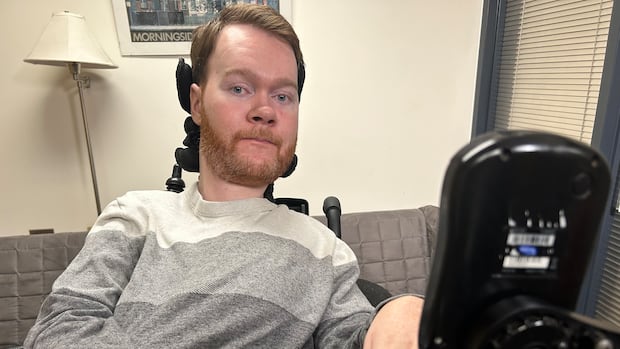Manitoba·NewA man who has gradually lost his ability to move most of his muscles said the treatment he’s relying on to slow — and even reverse — his degenerative disease is being revoked.Province refuses, asks drug manufacturer to continue free coverageIan Froese · CBC News · Posted: Nov 20, 2025 10:06 PM EST | Last Updated: 22 minutes agoListen to this articleEstimated 5 minutesThe audio version of this article is generated by text-to-speech, a technology based on artificial intelligence.Jeremy Bray has a degenerative disease that’s gradually robbed him of the ability to move his muscles. Since May, he’s been getting a medicine that’s halted the progress of the disease, but the company says it cannot keep providing the treatment for free. (Ian Froese/CBC)A man who has gradually lost his ability to move most of his muscles saysthe treatment he’s relying on to slow — and even reverse — his degenerative disease is being revoked.Jeremy Bray, 30, said he only has a month of treatment left for his Type 2 spinal muscular atrophy because the drug company is ending free coverage.That prompted him to once again urge the Manitoba government to cover the price of his life-sustaining drug while he still has some independence in his life. “I don’t want to be put on an expensive treatment that isn’t benefitting me,” Bray said. “I want to try this treatment that has already benefitted me and to be assessed along the way.”The data consultant from Rivers, Man., has already lost the capacity to move his head, arms, hands and legs. Now, he’s down to the use of just one thumb, his mouth and parts of his face, but those muscles have gradually weakened.Drug company offered free coverageThat changed in May after Manitoba’s health minister said the government persuaded Roque, the drug’s manufacturer, to extend free coverage to Bray on compassionate grounds.Since then, Bray has experienced a remarkable turnaround.He says his facial movements have become more expressive, his voice got stronger, and he can work longer days without needing rest.“When I found out all of the stability and even improvement might be snatched away, I was devastated, afraid,” Bray said.He’s always known that one day he would lose his physical functions, he said.Jeremy Bray, centre, with his friends Ryan and Hayley Lamb. He was the best man at the couple’s wedding in 2021. (Submitted by Jeremy Bray)“And then, finally, when I went on this treatment, it seemed like, ‘Oh my goodness, my situation might not just get worse as time goes on. I might have hope.’”He found out last week the treatment is being withdrawn, and he turned to the provincial government to reconsider its refusal to pay for the hugely expensive treatment, estimated at $300,000 in the first year. The NDP government has cited guidance from Canada’s Drug Agency (CDA) that the drug — risdiplam, sold under the brand name Evrysdi — isn’t recommended for adults over 25 because people from that age group haven’t been involved in any clinical tests.Earlier this year, the province asked the CDA, which is responsible for co-ordinating drug policy among provinces and territories, to conduct an “urgent review,” citing the “real-world evidence” it has received of the drug’s benefits from a neurologist in Manitoba.However, the agency maintained there isn’t enough evidence to reverse its decision.After the Manitoba Progressive Conservatives raised Bray’s plea in question period, Health Minister Uzoma Asagwara urged Roque on Thursday to indefinitely extend its free coverage, and later said in an interview it would ask the federal agency whether any other options are available.Asagwara showed no willingness to overrule its judgment. “They are the experts in this field. They determine what drugs are recommended and available for Canadians and for, in this case, Manitobans,” Asagwara said in an interview.Manitoba currently pays for risdiplam for patients under the age of 25.Quebec has no age restrictions for access. A Quebec doctor previously told CBC News around 90 per cent of his adult patients with spinal muscular atrophy have benefited from risdiplam.He also said the agency won’t find new clinical studies to use as evidence because it’s unethical to conduct a study in which some patients receive treatment and others don’t, since the drugs have been proven to work in Canada and other countries.Jeremy Bray met Manitoba Health Minister Uzoma Asagwara in their office in February. The province has so far refused to pay for his treatment, citing the recommendation from Canada’s Drug Agency. (Tyson Koschik/CBC)All other provinces follow guidance from the agency, but some jurisdictions, including Saskatchewan, Alberta and Ontario, have opted to pay for treatment for adults in some cases, according to patient advocacy group SMA Canada.Progressive Conservative Leader Obby Khan says Manitoba should follow suit.“Imagine if that was your kid and … they saw improvements [in their mobility] and this minister callously cut that,” Khan said.“Other provinces have realized this drug will help people, is worth funding to help someone in their life,” he said. “This minister, we see it clear as day, has the power to authorize this and won’t do it.” Roque communications manager Amy Haddlesey said in a statement the firm cannot continue to provide the medicine for free “as it is not a viable or sustainable solution for patient access to medicines or for the health-care system. Such a practice also creates a disparity, in that it does not address the systemic funding barrier for other patients who are not able to access the medicines they need.Haddlesey adds provincial decision-makers have the power to “explore new pathways” for treatment options “and take decisions to ensure sustainable, equitable access.”ABOUT THE AUTHORIan Froese covers the Manitoba Legislature and provincial politics for CBC News in Winnipeg. He also serves as president of the legislature’s press gallery. You can reach him at ian.froese@cbc.ca. Twitter: @ianfroese
Thursday, 5 Mar 2026
Canada – The Illusion
Search
Have an existing account?
Sign In
© 2022 Foxiz News Network. Ruby Design Company. All Rights Reserved.
You May also Like
- More News:
- history
- Standing Bear Network
- John Gonzalez
- ᐊᔭᐦᑊ ayahp — It happened
- Creation
- Beneath the Water
- Olympic gold medal
- Jim Thorpe
- type O blood
- the bringer of life
- Raven
- Wás’agi
- NoiseCat
- 'Sugarcane'
- The rivers still sing
- ᑲᓂᐸᐏᐟ ᒪᐢᑿ
- ᐅᑳᐤ okâw — We remember
- ᐊᓂᓈᐯᐃᐧᐣ aninâpêwin — Truth
- This is what it means to be human.
- Nokoma











